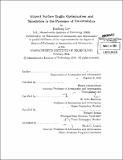Airport surface traffic optimization and simulation in the presence of uncertainties
Author(s)
Lee, Hanbong
DownloadFull printable version (18.54Mb)
Other Contributors
Massachusetts Institute of Technology. Department of Aeronautics and Astronautics.
Advisor
Hamsa Balakrishnan.
Terms of use
Metadata
Show full item recordAbstract
Surface traffic congestion causes significant taxi delays and long queues for takeoffs at busy airports, increasing operational and environmental costs. These impacts may be mitigated by optimizing runway and taxiway schedules. In prior research, runway scheduling algorithms and taxiway schedule optimization models have been developed independently, but they are closely related in airport operations. This motivates the development of a fast and efficient algorithm for solving both scheduling problems simultaneously. While the current surface traffic optimization is mainly based on a deterministic model, there exist lots of uncertainties in airport operations. These uncertainty factors can affect airport performance, but their impacts have not been adequately understood so far. In this thesis, two different approaches for airport surface traffic optimization are presented. The first is an integrated approach based on a mixed-integer linear programming (MILP) model to optimize both taxiway and runway schedules simultaneously, while the second is a sequential approach that combines independent runway and taxiway scheduling algorithms. The two optimization approaches are compared using various flight schedule scenarios at Detroit airport (DTW). The second part of the thesis compares two types of control concepts for surface traffic management. The individual aircraft trajectory-based control uses the optimal solution of the surface traffic optimization as control inputs, whereas the aggregate queue-based control maintains the number of taxiing-out aircraft on the ground below a given departure queue capacity control parameter. These two control concepts are implemented in the SIMMOD environment with the same flight schedules and evaluated in terms of various airport performance metrics. The last part of the thesis deals with the impacts of uncertainties on airport performance. Through stochastic simulations using SIMMOD, various sources of uncertainty, such as pushback times, runway exit times, taxi speeds, and runway separation times, are evaluated using flight schedules at DTW. The simulation results show that ground delays increase with an increase in uncertainty levels for most scenarios. However, the surface traffic optimization based on a deterministic model can still provide benefits even in the presence of certain types of uncertainties.
Description
Thesis: Ph. D., Massachusetts Institute of Technology, Department of Aeronautics and Astronautics, 2014. Cataloged from PDF version of thesis. Includes bibliographical references (pages 155-166).
Date issued
2014Department
Massachusetts Institute of Technology. Department of Aeronautics and AstronauticsPublisher
Massachusetts Institute of Technology
Keywords
Aeronautics and Astronautics.